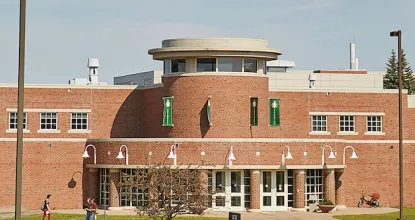About the Portable Planetarium Program
The Seaborg Center offers a solution for local schools and community groups who wish to engage in space science exploration and familiarize students with astronomy. An inflated structure 16 feet across and 11 feet high, STARLAB can accommodate up to 25 students. The Portable Planetarium travels to your location and can be set up quickly to serve your needs conveniently. The digital projector and dome technology provide immersive environments that simulate Earth’s skies, demonstrate solar system science, and provide grand tours of the cosmos. An experienced planetarium specialist will work with groups on Next Generation Science Standards (NGSS) aligned topics or the planetarium system can simply be used to motivate and inspire curiosity through edutainment.
Scheduling
- Half-Day Visits can include up to three presentations - $150
- Full-Day visits can include up to five presentations - $200
- Each Session can accommodate a maximum of 20-25 students
To arrange a visit or learn more, please contact the Seaborg Center at 906 227-2002 or seaborg@nmu.edu.
Program Offerings
General Content for all ages
Approximately 45 minutes in length, these shows can be scaled up or down and be tailored to meet your needs and interests.
- The Sky Tonight (45 minutes) – Learn about the basic motions of objects in our sky, how to read a star map, and learn to identify a few seasonal constellations. Learn about the phases of the moon, what planets are visible, and how the sky looks from different locations on Earth.
- A Tour of Space (45 minutes) – Learn about the constellations and mythology of the stars overhead. Then leave Earth behind to explore a few of the planets and their distances from the Sun as we leave the solar system and explore some of the deep sky objects (nebula, clusters, etc.) found in the Milky Way. Finally, leave our galaxy and explore other galaxies and their shapes before exploring the apparent structure of the visible Universe.
- Full Dome, Theater Style Shows – These are professionally made, immersive films that take you on a variety
of adventures as you learn about many different topics. See list below for titles.- Two Small Pieces of Glass
- Search for the Edge of the Solar System
- More to come…
NGSS Aligned Programs
Approximately 1 hour in length. These lessons typically involve active learning, discussions, engineering applications, and/or white-boarding by students. The dome provides a simulation space where visualization and data collection can happen.
- 1st Grade – Focus on Planning & Carrying Out Investigations and Analyzing & Interpreting Data while looking at patterns of motion of our Sun, Moon, and stars.
- 5th Grade – Focus on Analyzing & Interpreting Data and Engaging in Argument from Evidence while exploring gravity, the apparent brightness of stars due to their distance from us, and patterns of motion of the planets, seasonal stars, seasonal shifts of shadows, and more.
- Middle School – Focus on Analyzing & Interpreting data and Developing & Using Models while exploring lunar phases, eclipses, reasons for the seasons, scale of the solar system, gravity and orbital motions, or exploring features of solar system objects.
- High School – Focus on Developing & Using Models, Using Mathematical & Computational Thinking, Constructing Explanations and Designing Solutions, and Obtaining, Evaluating, and Communicating Information while exploring the life and death of stars (including fusion), evidence of the Big Bang, and looking closer at the force of gravity in our solar system and the Milky Way.
The Seaborg Center is partnering with the Shiras Planetarium in Marquette to support a laddered offering where local schools or community groups can experience both types of planetarium systems as you take a spiraled approach to learning more about topics of interest. Inquire for more details.
The Classic Starlab model is available to individuals who have received training at no additional cost to their school or organization.
